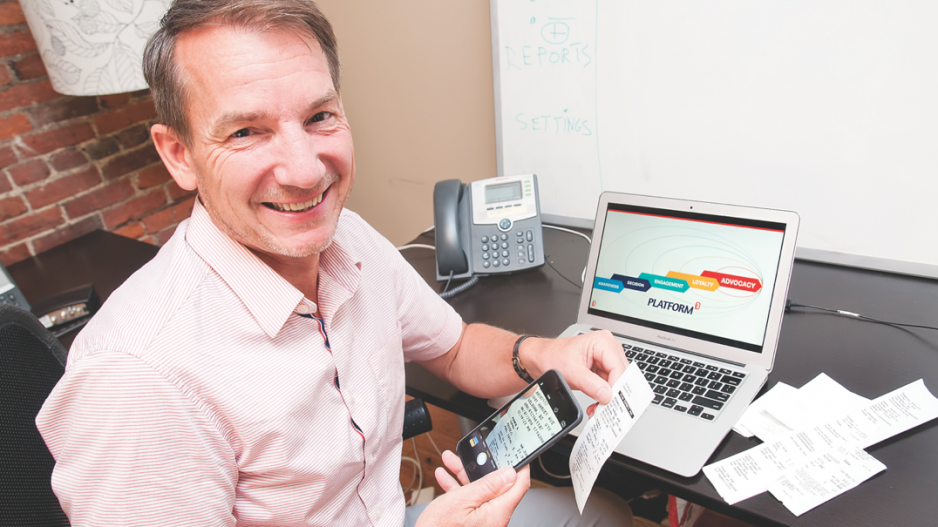If you buy $8 of Danone (EPA:BN; SWX:DAN) yogurt, you get a movie ticket. Buy $13 worth, and you get two tickets for your next date night.
This is the type of rewards program run by 3 Tier Logic (3TL). On the surface, the Vancouver-based company provides the platform that allows customers to claim their rewards – after buying some yogurt, they photograph their receipt, upload it to a 3TL site and get a movie ticket in return.
In reality, 3TL is in the market of collecting your retail data as you collect that reward, and they do it on behalf of some of the world’s biggest brands, including Electronic Arts (Nasdaq:EA), Dr Pepper (NYSE:DPS), Doritos (NYSE:PEP), Kellogg’s (NYSE:K), Unilever (AMS:UNA) and Huggies (NYSE:KMB).
“That’s why we’re growing so quickly and we’re getting these big brands – because we allow them to influence purchasing decisions in the store aisle, and we allow them to connect with shoppers through mobile in the store aisle,” said Robert Craig, co-founder and CEO of 3TL.
Data collection is a big deal for consumer packaged goods companies, which historically have been unable to run rewards programs and reap the consumer data that comes with them.
If you buy a Mars bar or some beef jerky from 7-Eleven, for example – both Mars Canada and Jack Link’s, the fastest-growing meat snack manufacturer in the world, are clients of 3TL – you’re a customer of the corner store. 7-Eleven, or your credit card company, has access to your shopping data, but the information fails to make its way to the company whose product you’re purchasing.
“These brands are wanting to learn more about you, wanting to develop a connection with you because they want to sell directly to you,” said Craig. “Now the program is: buy beef jerky, take a picture of the receipt and register it at a microsite. Well, as soon as you register, you walk in as a 7-Eleven customer, but you leave as a Jack Link’s customer or a Mars customer, because you registered with them, you connected with them.”
Craig calls this technology a “game-changer” for the industry.
“For the first time in history, a consumer packaged goods company can send a coupon based on your purchase behaviour,” he said.
On top of collecting a name and email, consumer packaged goods companies receive information such as when you purchased an item, from which store and along with what other products, every time a receipt is uploaded. That one receipt, destined for a landfill or crumpled up in the depths of a pocket, is data gold for companies like Mars.
Earlier this year, Fandango Rewards, a subsidiary of NBCUniversal’s movie ticket seller Fandango Media, left one of 3TL’s competitors and announced a multi-year agreement to license 3TL’s technology. The deal allows Fandango to offer more sophisticated and customized rewards campaigns to consumer packaged goods companies, which collectively buy millions of movie tickets to give away in exchange for the data collected in the rewards campaign.
The campaign with Danone was the most successful receipt-scanning program 3TL or Fandango has run to date, with tens of thousands of receipts uploaded during the promotion.
“It’s a big deal for Fandango and NBCUniversal,” Craig said. “They might run 100 to 200 promotions like that a year.” He added that his company’s deal with Fandango is just one of 85 different rewards programs 3TL runs. While the company’s market share remains small, Craig said the company is growing “super fast,” and as with Fandango, 83% of 3TL’s business now comes from competitors.
“Rewards programs are something that consumers like and enjoy, and it’s also good for companies because they’re effective at getting people to come back,” explained David Hardisty, an assistant professor of marketing and behavioural science at the University of British Columbia’s Sauder School of Business.
“It’s especially good because those long-term repeat customers are much more valuable to companies,” Hardisty said. “Trying to bring in a brand-new customer is really difficult and expensive – the cost of acquisition of a new customer is often pretty high, whereas if you can just retain an existing customer for a lower cost, that’s also much more effective.”
Data collection for consumer packaged goods companies isn’t that new an idea, and 3TL wasn’t first to market. Instead, the company spent four years and $4 million developing its signature technology.
As a result, 3TL was the first to offer data collection, rewards programs, consumer-to-consumer marketing, social sharing, targeted couponing and a suite of other features all wrapped into one product.
Now, 3TL is breaking ground with Internet ads.
“The companies that deliver these ads are constantly collecting data,” Craig said. “But they still can’t tell whether or not the person that views an ad actually goes into a store and buys something. We can now track that.”
3TL bridges the data divide between the digital and in-store realms. And while the sophistication of the company’s consumer-tracking capabilities may border on the Orwellian – there’s no such thing as a “free” reward – it’s lucrative, and offers companies the opportunity to base strategic business decisions on data and results.
Craig said the company will continue to expand its business in the U.S. market. 3TL recently doubled its sales force and has two full-time staff members in Chicago and one in Bentonville, Arkansas, home to Wal-Mart (NYSE:WMT) headquarters. •




